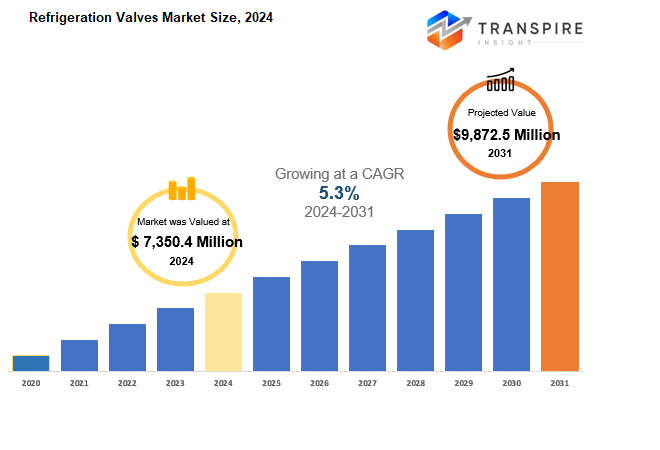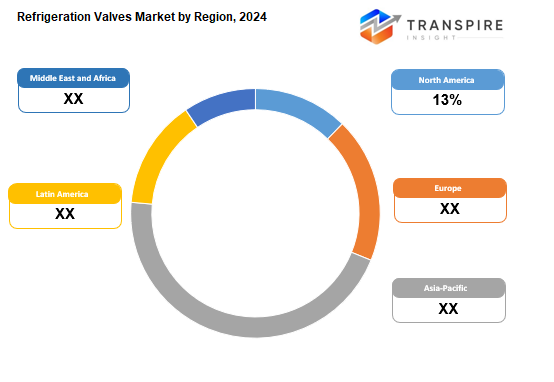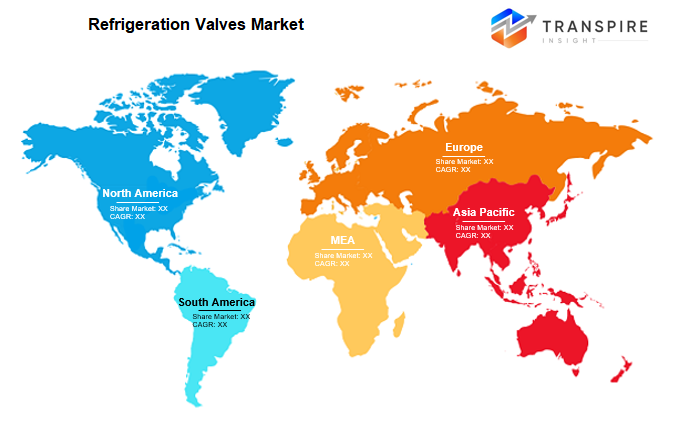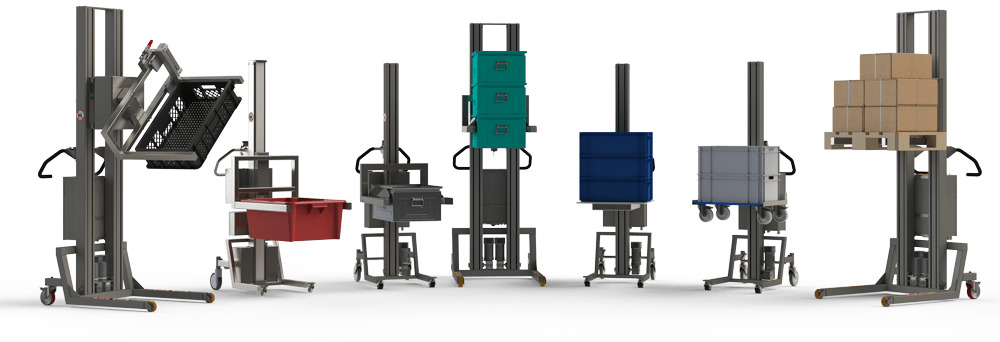MARKET OVERVIEW
Global Refrigeration Valves market is estimated to reach $9872.5 Million by 2031; growing at a CAGR of 5.3% from 2024 to 2031.
The Global Refrigeration Valves market plays a crucial role within the broader refrigeration industry by regulating and controlling the flow of refrigerants in cooling systems used across a wide range of sectors. These systems, which include industrial, commercial, residential, and transportation applications, require efficient and effective refrigeration valves to ensure optimal performance and longevity. The demand for specialty valves is expected to increase due to advancements in refrigeration technology, with a focus on improved performance, environmental sustainability, and energy efficiency driving market growth.
Refrigeration valves are specialized components designed to deliver precise cooling functions in various systems such as food preservation, air conditioning, and medical refrigeration. With different types of valves available, including solenoid, expansion, check, and shut-off valves, manufacturers and service providers can tailor cooling processes to specific requirements. For instance, expansion valves play a critical role in controlling refrigerant flow to maintain seamless cooling cycles. The widespread application of refrigeration valves across industries like food and beverage, pharmaceuticals, automotive, and retail underscores their indispensable nature in ensuring temperature control and product integrity throughout various operations. The market for refrigeration valves is expanding globally, driven by advancements in technology, sustainability concerns, and the growing demand for high-performance cooling solutions across industries.

GROWTH FACTORS
The global refrigeration valves market is poised for stable growth in the coming years due to various key factors driving the industry forward. One of the primary drivers of growth is the increasing demand for refrigerated food and beverage products, driven by consumers' preference for fresher foods. This demand extends beyond the food industry to pharmaceutical and medical sectors, which require chilled storage solutions that maintain the integrity of temperature-sensitive drugs and vaccines. The advancement of refrigeration systems technology is also contributing to the growth of the market, with a focus on sustainability, energy efficiency, and environmental impact reduction. Enhanced valve technologies are making refrigeration systems more reliable and cost-effective, attracting industries seeking performance and environmental responsibility.
Despite significant challenges such as high initial capital costs and regulatory requirements related to refrigerants and environmental compliance, the refrigeration valves market presents promising opportunities for the future. As companies align themselves with global environmental goals by adopting sustainable and innovative refrigeration solutions, they can tap into demand from emerging economies in food processing, healthcare, and logistics sectors. With a growing focus on reducing carbon footprint across various sectors, the demand for high-performance refrigeration solutions is expected to increase. Investing in refrigeration valves that meet regulatory standards and consumer expectations can position companies for success in a market poised for continued growth and innovation in the years ahead.

MARKET SEGMENTATION
By Type
The Global Refrigeration Valves market is poised to see a surge in importance due to the increasing global need for efficient cooling and refrigeration systems. These systems are now recognized as crucial for maintaining the quality of perishable goods, especially in sectors such as food, beverages, pharmaceuticals, and logistics. Key segments of the market, including Solenoid valves, expansion valves, check valves, and service valves, all play unique roles in enhancing the efficiency, control, and overall performance of refrigeration systems. Solenoid valves, known for their precise control and minimal energy consumption, are likely to see expanded use as industries move towards automation and energy efficiency. Expansion valves, on the other hand, are vital for regulating refrigerant flow and pressure to optimize energy usage, aligning with the global push for more energy-efficient systems. Check valves offer reliability in preventing backflow, crucial for industries like healthcare and logistics where system longevity and safety are paramount. Lastly, service valves allow for on-the-fly support and maintenance, reducing downtime and catering to the increasing complexity of modern refrigeration systems. As industries continue to prioritize efficiency, safety, and reliability, the demand for these essential refrigeration valves is expected to grow significantly.
By Application
The global market for refrigeration valves is showing promising growth prospects as demand continues to rise across various applications, including commercial and industrial refrigeration, residential uses, transport refrigeration, and air conditioning systems. Industries and consumers are placing a strong emphasis on efficiency, reliability, and sustainability in these areas of significant value. Refrigeration valves play a crucial role in controlling flow and pressure within refrigeration systems, ensuring optimal performance and helping to minimize energy consumption. With a growing focus on energy efficiency and advancements in valve technology, the future of the refrigeration valves market looks bright, as businesses and households seek environmentally friendly and cost-effective solutions.
The market for refrigeration valves can be segmented into various application-based categories that drive overall demand and development. Commercial refrigeration applications in grocery stores, food services, and supermarkets rely heavily on these valves to maintain consistent temperatures and prevent spoilage. The industrial refrigeration sector, with a market value of 1466.9 million USD in 2023, is essential for food processing, cold storage, and manufacturing, with a strong growth trajectory driven by increasing sustainability efforts. Transport refrigeration, crucial for maintaining quality during long-distance shipments, holds significant growth potential as global supply chains expand and temperature control becomes more critical. Residential refrigeration, as families globally adopt newer technologies, is seeing increased demand for valves in innovative home appliances, addressing consumer expectations of noise and energy efficiency. Additionally, the growing use of air conditioning systems in both residential and commercial buildings due to changing climates and rising temperatures will drive up the demand for reliable refrigeration valves. As the importance of accurate temperature regulation and energy efficiency is recognized across all segments, the global market for refrigeration valves is poised for substantial growth in the coming years, with advancements in materials, design, and digital control systems improving efficiency, reliability, and environmental impact to meet the sustainability goals of businesses and consumers in an increasingly energy-conscious world.
By End User
The Global Refrigeration Valves market is on the rise, thanks to the growing demand for efficient refrigeration systems across various industries. Refrigeration valves are crucial in controlling the flow of refrigerant, leading to more effective cooling systems and reduced energy loss. As technology continues to advance, the development of innovative refrigeration valves for different applications will enhance the reliability and efficiency of refrigeration systems, driving up demand across industries. One of the key sectors benefiting from the Global Refrigeration Valves market is the food and beverages industry, where the need for proper cooling systems to preserve frozen and refrigerated products is essential. With optimized system performance and minimal energy consumption offered by refrigeration valves, companies in this sector are increasingly drawn to the economic and environmental benefits. Similarly, the pharmaceutical industry relies on refrigeration systems to store temperature-sensitive drugs and vaccines, pushing for precise temperature control and driving the market for high-quality refrigeration valves.
REGIONAL ANALYSIS
The global refrigeration valves market continues to experience a positive demand driven by various regional factors across different regions. North America, consisting of the United States, Canada, and Mexico, stands out due to its focus on technology-driven innovations and energy efficiency. With a strong emphasis on minimizing energy consumption, North America remains a crucial market for the refrigeration valves industry, as companies invest in innovative solutions for residential and commercial applications to meet tightening environmental regulations.
Following North America, the European market, including major players such as the UK, Germany, France, and Italy, prioritizes environmental policies, pushing industries towards greener solutions. The demand for advanced refrigeration valves supporting eco-friendly refrigerants is on the rise, as sustainability becomes a key focus. Manufacturers in Europe are expected to develop valves with minimal environmental impact, driving market growth. Meanwhile, countries in the Asia-Pacific region like China, India, Japan, and South Korea are experiencing rapid growth in industrial refrigeration due to urbanization and expansion in the food and beverage industry, leading to increased investment in cold storage and logistics. In these populous countries, reliable refrigeration solutions are essential, fueling growth in the refrigeration valves market as manufacturers respond to local market demands with cost-effective and efficient products.

KEY INDUSTRY PLAYERS
The Global Refrigeration Valves market plays a crucial role in the current landscape, driven by technological advancements in refrigeration and the growing demand for efficient cooling solutions. Key industry players such as Honeywell International Inc., Thermo King Corporation, Sanhua International, Inc., and Copeland LP are at the forefront of innovation, developing products tailored to diverse cooling requirements worldwide. The industrial sector has witnessed a surge in demand for refrigeration valves, enabling better management of temperature-sensitive goods and improved system efficiency. With the rise of economies worldwide, there is a heightened need for reliable refrigeration in sectors like food storage, healthcare, and transportation, prompting the adoption of modern, energy-efficient, and environmentally friendly valve technologies. Companies like Parker Hannifin Corporation and Danfoss A/S are spearheading efforts in producing valves that enhance cooling efficiency, reduce energy consumption, and minimize greenhouse gas emissions, aligning with the growing emphasis on environmental responsibility. The market is characterized by fierce competition, driving companies to focus on innovation and research to meet evolving consumer needs. Advancements in smart technology are also reshaping the market, enabling real-time monitoring, control, and improved operational efficiency. Looking ahead, the future outlook for the Global Refrigeration Valves market is promising, with established players like Castel S.r.l., Hansen Technologies, and Mueller Industries, Inc. leading the way in developing sophisticated, efficient, and sustainable solutions to meet the evolving demands of the industry. Continued innovation will be key in defining the market's trajectory and ensuring its growth in the years to come.
REPORT SCOPE AND SEGMENTATION
|
Attributes |
Details |
|
Market Size By 2031 |
USD 9872.5 Million |
|
Growth Rate |
CAGR of 5.3% |
|
Forecast period |
2024 - 2031 |
|
Report Pages |
250+ |
|
By Type |
|
|
By Application |
|
|
By End User |
|
|
By Region |
|
|
Key Market Players |
|



_page-000179.jpg)
_page-000180.jpg)
_page-000178.jpg)
_page-000113.jpg)






 APAC:+91 7666513636
APAC:+91 7666513636





